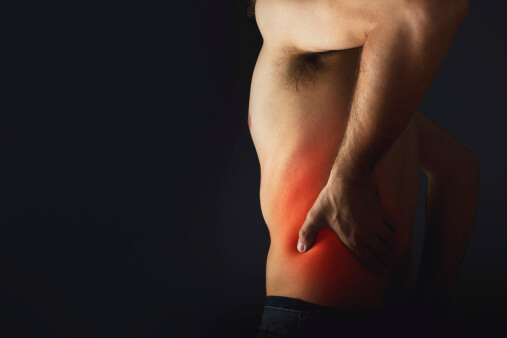
Back Spasms
Back spasms are the result of spontaneous, abnormal contractions of the muscles in the back near the spinal cord or nerve roots, and in most cases can cause the patient extreme pain.
Causes of Back Spasms
Back spasms, or changes in muscle responsiveness, may be the result of one of the following:
- Prolonged exercise – Ignoring sensations of pain and fatigue, which are your body’s signals that it is time to rest, can deplete your muscles of necessary nutrients. When your muscles are over-fatigued, they cannot relax and are more susceptible to cramps.
- Dehydration and Salt Depletion – When your body loses fluids and salts, such as sodium, potassium, magnesium, and calcium, your muscles may be prevented from responding and recovering normally, which can lead to back spasms.
- Genetics – Some people inherit metabolic disorders that can affect the energy supply in your muscles, preventing your muscles from contracting and relaxing normally.
- Myotopia – Myotopia is a disorder that causes delayed muscle relaxation. It usually causes stiffness in the muscle and is not known to cause spontaneous muscle cramping. However, patients with myotopia can experience spasms from exercise.
- Muscle Twitching – Also known as fasciculations, muscle twitching may be the result of fatigue, cold, medication, nerve damage, metabolic disorders, or neurodegenerative disease. Most people experience a muscle twitch in their calves, also known as a Charlie’s Horse.
- Contractures – Contractures are the chronic loss of joint motion due to structural changes that occur in muscles, ligaments, or tendons due to injury or disease, such as spinal cord damage. The most common symptom is immobility in one or more joints.
Symptoms
Back spasms often cause intense, localized pain that can sometimes be debilitating. The patient may feel a sudden pain while twisting, pushing, or pulling. The spasms usually occur quickly and may last for minutes and then gradually fade. In some cases, lying still, curled up with the knees bent and the spine arched forward is the only way to get relief from the pain.
Contractures, on the other hand, develop slowly – usually over days or weeks – and may become permanent if left untreated. Fasciculations, or muscle twitches, arise while the muscle is at rest or after a muscle contraction, and can last up to several minutes.
Diagnosis
To discover the cause and best treatment for back spasms, your chiropractor will first thoroughly evaluate your medical history and then perform a physical and neurological exam. An electromyography may be performed to record electrical activity in the muscle during rest and movement.
Treatment
Treatment usually involves gentle, gradual stretching and massage to the affected muscle to help ease pain and provide a quicker recovery. For dehydration-related spasms, fluid and salt replacement will be necessary to treat the muscles. If your spasms are the result of a metabolic or neurological disease, talk with your doctor about ways to treat your disease and relieve symptoms.
If you are experiencing the recurring back spasms, consult with a chiropractor to discuss the best treatment for you.